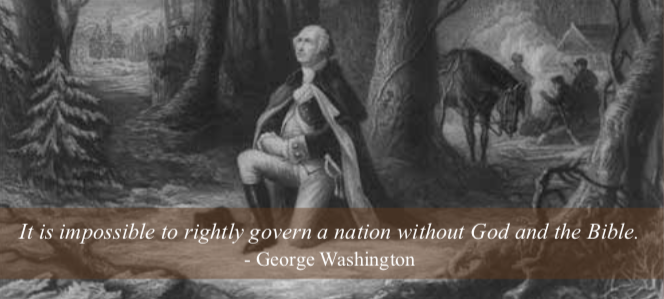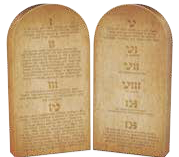Part One: The Biblical Purpose of Government
Chapter 2: Civil Government — God’s Ordinance
Origin
Before man fell into sin, he had complete liberty within the confines of obedience to God and His wisdom (Genesis 2:16-17; Proverbs 3:19). After Adam and Eve sinned, their newborn sinful nature threatened to destroy the liberty they enjoyed under God; so He established the laws of responsibility and coercive justice (Genesis 3:16-24) in order to preserve the system of rights and responsibilities that He had given to them (Genesis 1:26-27).
The law of responsibility consists of the natural consequences of our thoughts and actions, both positive and negative, which work together with our God-given reasoning ability and self-interest to shape our actions. For example, you touch a hot stove for the first time and get burned, so you refrain from doing so in the future in order to avoid repeating the painful experience. Conversely, you find that your health improves by eating certain types of food and exercising regularly, so you develop a routine of eating these foods and exercising in order to continue experiencing the benefits of good health. This can apply to our spiritual lives as well; the more of God’s Word we receive, the more we grow spiritually and are able to “walk in the Spirit” and thus “not fulfil the lust of the flesh” (Galatians 5:16). This discipline-reward dynamic is a testament to the goodness of our Creator, who has carefully designed His universe in such a manner that much of our activity is influenced to conform to His design without the need for divine or human regulation.
Unfortunately, due to the sinful corruption of both reason and self-interest,
man devised ways to circumvent the law of responsibility (Ecclesiastes 7:29),
moving God to establish the law of coercive justice.
 This law consists of the
willful (as opposed to natural) application of force, either divine or human, to
shape behavior in order to preserve God’s standard of justice. Most often this
law is seen as a check against aggressive violent crimes, such as a policeman
arresting a thief or a military establishment defending its nation against
invaders. However, it can also be implemented to encourage certain activity that
is beneficial to the general welfare of society (e.g., paying a reward to
someone who provides information leading to the capture of a criminal) or
compensate people for an injustice suffered (e.g., forcing a thief to return
stolen goods). For further examples and discussion of these two laws, read
Romans 1 and the book of Proverbs.
This law consists of the
willful (as opposed to natural) application of force, either divine or human, to
shape behavior in order to preserve God’s standard of justice. Most often this
law is seen as a check against aggressive violent crimes, such as a policeman
arresting a thief or a military establishment defending its nation against
invaders. However, it can also be implemented to encourage certain activity that
is beneficial to the general welfare of society (e.g., paying a reward to
someone who provides information leading to the capture of a criminal) or
compensate people for an injustice suffered (e.g., forcing a thief to return
stolen goods). For further examples and discussion of these two laws, read
Romans 1 and the book of Proverbs.
Though the law of coercive justice was initially limited to individuals and
families (Adam and Eve in Genesis 3; Cain in Genesis 4; Noah and his family
versus the world in Genesis 6),
 man’s social rebellion against God (Genesis
6:3-7) and the resulting anarchical chaos caused God to both implement divine
coercive justice in the form of a worldwide flood (Genesis 6:11-7:24) and
establish a system of human coercive justice in the form of a covenant with Noah
(Genesis 9:6-9). This covenant laid the foundation for what we today call civil
government. Predictably, it didn’t take long for man to pervert this covenant
with God by establishing a global tyranny under the rule of Nimrod, symbolized
by the Tower of Babel (Genesis 11:1-4). Once again, God implemented divine
coercive justice by confusing the language of the people and established a
system of human coercive justice by scattering them throughout the world into
individual nations as a check against a return to global tyranny (Genesis
11:5-9). He has provided us through His Word specific guidance for the
ordination, organization, and operation of these institutions.
man’s social rebellion against God (Genesis
6:3-7) and the resulting anarchical chaos caused God to both implement divine
coercive justice in the form of a worldwide flood (Genesis 6:11-7:24) and
establish a system of human coercive justice in the form of a covenant with Noah
(Genesis 9:6-9). This covenant laid the foundation for what we today call civil
government. Predictably, it didn’t take long for man to pervert this covenant
with God by establishing a global tyranny under the rule of Nimrod, symbolized
by the Tower of Babel (Genesis 11:1-4). Once again, God implemented divine
coercive justice by confusing the language of the people and established a
system of human coercive justice by scattering them throughout the world into
individual nations as a check against a return to global tyranny (Genesis
11:5-9). He has provided us through His Word specific guidance for the
ordination, organization, and operation of these institutions.
Ordination
“Let every soul be subject unto the higher powers. For there is no power but of God: the powers that be are ordained of God.” Romans 13:1 makes it clear that God gives civil government its authority (“power”) and design (“ordained”—literally, arranged in an orderly manner) and therefore implies a specific order that mandates conformity. When Jesus told Pilate, “Thou couldest have no power at all against me, except it were given thee from above” (John 19:10-11), He established that civil government’s power is not principal in nature but secondary. Psalm 2 and the book of Daniel further confirm that civil governments are accountable to God and are under His authority. All civil governments are accountable to God and are under His sovereign rule because they are His ministers and receive their power and authority from Him (Psalm 2:10-12; see also Daniel 2:21; 4:25; 5:21; Isaiah 13-23; Jeremiah 46-51; Ezekiel 25-32; Amos 1-2; Obadiah 1; Jonah 1-4; Nahum 1-3; Habakkuk 2; Zephaniah 2).
Since God is the source of governmental authority and design, a nation legitimizes its civil government by placing it under His sovereignty (Psalm 2:10-12; Exodus 19:5-8; Daniel 4:34-37). Therefore, in God’s eyes a civil government is not simply a person or group that has the power to impose its will on a society. Rather, it must be capable of, and faithful in, upholding the law of coercive justice in a society in such a manner that it serves the good of those who live according to God’s laws. Accordingly, Christians are commanded to submit to the authority of civil government since it is a gift from God for our good (Romans 13:1-7; 1 Peter 2:13-17; 1 Timothy 2:1-4; James 1:17-18; 2 Chronicles 7:3).
Organization
The Bible gives several examples of different forms of government such as the following: theocracy (history began with Adam and Eve’s family answering to God—Genesis 1-11; Eli and Samuel ruled as God’s spokesmen); absolute monarchy[4] 4. Today, the term totalitarian could be used to describe an absolute monarchy. Totalitarian, however, is a modern term and so would not have been a named form of government in Bible times. A totalitarian state can possess a monarchy, but an absolute monarchy is not a totalitarian state by definition. Louis the XIV, the English Tudors of the past, and King Abdullah were all absolute rulers, but their states are not totalitarian. (Luke 2:1; Mark 12:17; Exodus 1-14); monarchy (limited/constitutional: Deuteronomy 17:14-20; 2 Samuel 5:3; 2 Kings 11:17); autocracy (God chose and allowed Moses to be the one- man authority over the Israelites; this worked well because Moses was a humble man [Numbers 12:3] and a “friend of God” [James 2:23]. Had he not been humble or have a personal relationship with a God who guided him, this form of government could have dissolved into a dictatorship); constitutional republic (Exodus 18:21; Deuteronomy 1:15-16; 16:18); and oligarchy (Sanhedrin—Luke 22:66). It should be noted that anarchy and revolution (Deuteronomy 12:8; Judges 17:6; 21:25) show the condition of the denigration of governments.
The most important concepts to gather from studying the different forms of government in the Bible is that secure and successful (i.e. functioning according to God’s ideals) government systems will include these wise organizational concepts: (1) God should be the one to choose leaders. Thus Christians should be in consistent prayer that He would make it clear whom His choice is and direct Christian voters clearly toward His choice. (2) That qualified leaders must be chosen (not just those who hold a political agenda). God directed the leaders He chose for the nation of Israel to lead according to His law (Exodus 18:21); today, we must choose leaders who will lead according to Biblical principles. (3) As He allowed even His chosen people to modify their form of government as they saw fit (“Now therefore hearken unto their voice: howbeit yet protest solemnly unto them, and shew them the manner of the king that shall reign over them,” 1 Samuel 8:7-9), that His people also will exercise their God-given right to determine the administration of their government—particularly since they are responsible to God for how they govern themselves. This is why God instructed Samuel to grant the people their desire for a king while also warning them of the consequences that this form of government would bring.
Operation
Because He is good, God has ordained civil government to be a minister of His justice for three purposes: (1) to facilitate the peace and quiet of society; (2) to secure the rights and rewards of those who follow His laws; and (3) to punish evil.
The first purpose is clearly laid out in 1 Timothy 2:1-4:
I exhort therefore, that, first of all, supplications, prayers, intercessions, and giving of thanks, be made for all men; for kings, and for all that are in authority; that we may lead a quiet and peaceable life in all godliness and honesty. For this is good and acceptable in the sight of God our Saviour; who will have all men saved, and to come unto the knowledge of the truth.

This passage states that we are to ask God to provide us with and give thanks for governing authorities that enable us to “lead a quiet and peaceable life” while living according to His Word. Under these conditions, the gospel is able to spread unhindered, leading men to be “saved, and to come unto the knowledge of the truth.” Simply put, God established government so that it would enable men to live godly lives without unnatural disturbances, resulting in the ideal conditions for the spreading of His gospel and truth.
 Civil government receives its mandate to secure the rights and rewards of
those who follow God’s laws from several passages of Scripture. Romans 13:3-4
points out that “rulers are not a terror to good works … do that which is
good, and thou shalt have praise of the same: for he is the minister of God to
thee for good.” I Peter 2:13-17 says that government exists “for the praise
of them that do well” and so that “with well doing ye may put to silence the
ignorance of foolish men.” It also indicates that government exists to secure
our freedom to serve God rather than sin:
“As free, and not using your liberty
for a cloke of maliciousness, but as the servants of God.” The Ten Commandments
passage (Exodus 20) further supports the notion that God gives us freedom in
order to serve Him. Verse 2 says, “I am the Lord thy God, which have brought
thee out of the land of Egypt, out of the house of bondage.” This freedom from
“the house of bondage” enabled the Israelites to fulfill the list of commands
given in the verses immediately following this statement (vv. 3-17).
Civil government receives its mandate to secure the rights and rewards of
those who follow God’s laws from several passages of Scripture. Romans 13:3-4
points out that “rulers are not a terror to good works … do that which is
good, and thou shalt have praise of the same: for he is the minister of God to
thee for good.” I Peter 2:13-17 says that government exists “for the praise
of them that do well” and so that “with well doing ye may put to silence the
ignorance of foolish men.” It also indicates that government exists to secure
our freedom to serve God rather than sin:
“As free, and not using your liberty
for a cloke of maliciousness, but as the servants of God.” The Ten Commandments
passage (Exodus 20) further supports the notion that God gives us freedom in
order to serve Him. Verse 2 says, “I am the Lord thy God, which have brought
thee out of the land of Egypt, out of the house of bondage.” This freedom from
“the house of bondage” enabled the Israelites to fulfill the list of commands
given in the verses immediately following this statement (vv. 3-17).
These passages bring to light an important principle—the Biblical concept of rights. According to the Bible, rights and responsibilities are inseparable. That is, we only have rights because we have corresponding responsibilities to God our Creator. Since He made us, we are accountable to Him for how we live (Romans 14:12; 2 Corinthians 5:10). Therefore, we require certain rights to secure our ability to fulfill that responsibility. These rights are unalienable because they come from God, and our duty to Him supersedes that of any other authority (Acts 5:29). God created man for three basic purposes, as stated in His covenant with Adam (Genesis 1:28) and then repeated in His covenant with Noah (Genesis 9:6-7): (1) “be fruitful and multiply”; (2) “replenish the earth”; and (3) “subdue it; and have dominion.” Each of these responsibilities implies/requires a corresponding right: (1) life; (2) liberty; and (3) property. Since the Adamic covenant was pre-Fall, it did not require governmental protection of these rights. However, the Noahic covenant was preceded by the statement “Whoso sheddeth man’s blood, by man shall his blood be shed: for in the image of God made he man,” establishing civil government as a means of securing man’s God-given rights. The remainder of God’s law further supports and protects these rights and responsibilities and serves as the basis for establishing the laws by which civil governments operate.
As discussed in chapter 1, God’s law is found both in the natural laws (science and humanity, Proverbs 3:19; 8:31) and in His revealed law (the Bible, 2 Timothy 3:16-17). In Proverbs 8:14-16, wisdom (God’s law) says, “Counsel is mine, and sound wisdom: I am understanding; I have strength. By me kings reign, and princes decree justice. By me princes rule, and nobles, even all the judges of the earth.” Thus, we see that by beginning with the revealed law and applying reason to the natural laws, we can discover the laws of God and His design for civil government.
This concept of discovering the established civil laws of God in accordance with the natural and revealed laws (as opposed to man inventing his own laws based on reason alone) was adopted by several legal philosophers known as the “Constitutional Scholars” (including John Milton, Edward Coke, Hugo Grotius, John Locke, Montesquieu, and William Blackstone).[5] 5. For more information regarding the “Constitutional Scholars” as well as to provide an enlightening educational experience, read John Eidsmoe’s book Historical and Theological Foundations of Law: Reformation and Colonial. John Locke (1632-1704) elaborated on this approach as seen in his writings when he says:

| The law of nature stands as an eternal rule to all men, legislator as well as others. The rules that they make for other men’s actions must … be conformable to the law of nature, i.e., to the will of God … . Laws human must be made according to the general laws of nature and without contradiction to any positive law of Scripture, otherwise they are ill made.[6] 6. John Locke, Second Treatise of Civil Government,https://constitution.org/2-Authors/jl/2ndtr00.htm. |
William Blackstone offered his supporting insights by writing:

| Man, considered as a creature, must necessarily be subject to the laws of his Creator, for he is entirely a dependent being … . And consequently, as man depends absolutely upon his Maker for everything, it is necessary that he should in all points conform to his Maker’s will. This will of his Maker is called the law of nature … . It is binding over all the globe, in all countries, and at all times; no human laws are of any validity if contrary to this … . The doctrines thus delivered we call the revealed or Divine law and they are to be found only in the Holy Scriptures … . Upon these two foundations, the law of nature and the law of revelation, depend all human laws.[7] 7. “Paul Enlow,” Law Center for Religious Freedom, http://paulenlow.com/editorials_04262005.html. |
In order to avoid confusion and contradiction when using the Bible as a source book for civil law, it is important to identify the different forms of Biblical law and determine which are relevant to civil government. David Barton elaborates on this in an article titled, “The Ten Commandments: the Moral Law for Nations” where he states that there are four types of Biblical law: ceremonial law, moral law, judicial law, and social compact law. Ceremonial laws are unique to Israel as types and shadows of Christ’s future death on the cross. Noah Webster described these laws as “the Mosaic institutions which prescribe the external rites and ceremonies to be observed by the Jews.” For Christians, these laws have been fulfilled by the sacrifice of Jesus Christ and are therefore no longer binding on us (2 Corinthians 5:21; Hebrews 10:4-14). Moral laws are God’s declaration of what is morally acceptable to Him. Since God’s character is unchanging (Hebrews 13:8) and Christ did not abolish the Law and the prophets (Matthew 5:17), God’s moral law does not change. Therefore, moral law is just as applicable to New Testament Christians as it was when it was first delivered over 3,500 years ago (1 Corinthians 6:9-10). Judicial laws are the civil and statutory laws that take the moral law and assign penalties for its violation. They are distinct from the moral law, as evidenced by the fact that the Ten Commandments attach no judicial penalty to any of its commands. These laws apply only to civil government and can and do change. For example, in John 8:1-11 the scribes and Pharisees bring a woman caught in adultery to Jesus and demand that she be stoned according to the Old Testament law. Christ, however, gave no death sentence, though He still viewed it as sin. However, it is important to note that moral law and judicial law overlap in that the penalties for a violation of moral law should be moral (i.e., the punishment should fit the crime - Exodus 21:22-25; Leviticus 24:19-20; Deuteronomy 19:15-21). Unlike moral law (absolute rights and wrongs), social compact law involves relative rights and wrongs based on society’s agreement (e.g., speed limits, parking regulations, municipal ordinances, etc.). This is law enacted “by the consent of the governed” and can only regulate things not covered by moral law. An example of this type of law is seen in Boaz’s approach to marrying Ruth (Ruth 4:7). Thus, when establishing law, legislators should look to the unchanging moral laws of God as their basis while viewing the judicial and social compact laws as non-binding examples of law in their respective cultural and historical settings.[8] 8. David Barton, “The Ten Commandments: The Moral Law for Nations,” in The Founder’s Bible, ed. Brad Cummings (Newbury Park, California: Shiloh Road Publishers, LLC, 2012), 161-170 (paraphrase).
The third God-ordained purpose of civil government—punishing evil— is an implied necessity for accomplishing the first two purposes. Romans 13:3-4 says, “For rulers are not a terror to good works, but to the evil … if thou do that which is evil, be afraid; for he beareth not the sword in vain: for he is the minister of God, a revenger to execute wrath upon him that doeth evil.” Proverbs 24:25 says, “But to them that rebuke him [the wicked] shall be delight, and a good blessing shall come upon them.” Just as the government is to look to the moral law of God when determining what is to be protected as a God-given right, so it must also do when determining what is to be punished as a threat to God-given rights (i.e., evil).
Summary
In this chapter we learned that civil government is (1) a consequence of the Fall; (2) God’s idea—it is accountable to and derives its authority from Him; (3) a positive force in a fallen world—we are commanded to submit to it; and (4) a minister of God’s law of coercive justice to protect our ability to serve Him and enjoy the resulting blessings.
↩ 4. Today, the term totalitarian could be used to describe an absolute monarchy. Totalitarian, however, is a modern term and so would not have been a named form of government in Bible times. A totalitarian state can possess a monarchy, but an absolute monarchy is not a totalitarian state by definition. Louis the XIV, the English Tudors of the past, and King Abdullah were all absolute rulers, but their states are not totalitarian.
↩ 5. For more information regarding the “Constitutional Scholars” as well as to provide an enlightening educational experience, read John Eidsmoe’s book Historical and Theological Foundations of Law: Reformation and Colonial.
↩ 6. John Locke, Second Treatise of Civil Government, https://constitution.org/2-Authors/jl/2ndtr00.htm.
↩ 7. “Paul Enlow,” Law Center for Religious Freedom, http://paulenlow.com/editorials_04262005.html.
↩ 8. David Barton, “The Ten Commandments: The Moral Law for Nations,” in The Founder’s Bible, ed. Brad Cummings (Newbury Park, California: Shiloh Road Publishers, LLC, 2012), 161-170 (paraphrase).